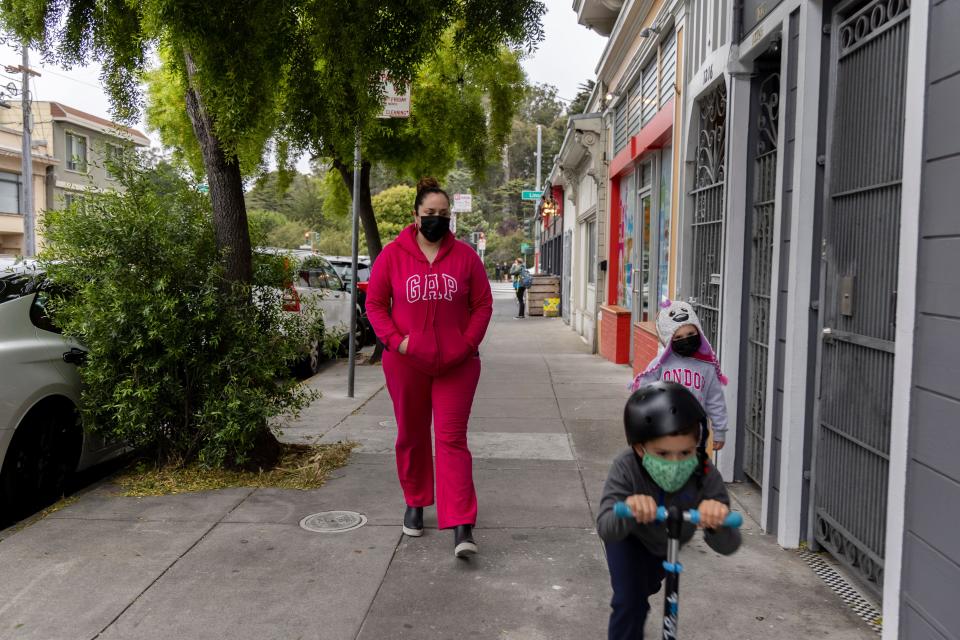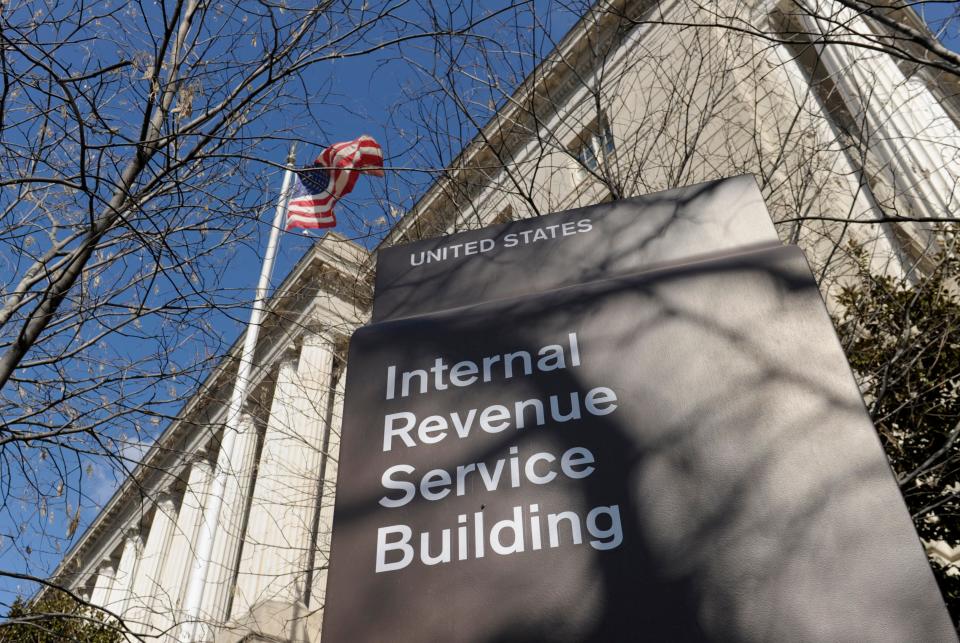Some families scratching their heads after finding cuts to their October child tax credit payment
It's time to check the mailbox and bank account for extra cash from the October child tax credit that rolled out Friday.
Many parents saw the money hit their accounts as expected, just as it arrived for the past three months.
Unfortunately, it looks like it won't be smooth sailing for everyone. As in the past, some families are scratching their heads over quirky shortfalls for their payments.
Some of this could be an adjustment based on the latest data the Internal Revenue Service has on a family's income or household. For some, the reduced payout could be an IRS fix to an earlier problem. For many, there are more questions than answers.

► Child tax credit: The child tax credit gave the typical family $5,086. Will Congress extend it for 2022?
Millions of eligible families are receiving up to $300 per month for each qualifying child ages 5 and younger and up to $250 per month for each child ages 6 to 17. The monthly payouts run from July through December.
The next round of payments will be Nov. 15 and Dec. 15.
Many families expected to receive the same dollar amount each month once the advance child tax credit payments began July 15. And many are receiving the same amount each month.

► It's 'going to make a difference': Families plan how they’ll spend extra cash from the child tax credit.
But some started noticing smaller payments for September and now they say they see small payments for October. Some are getting less money in October than they did after a cut in the payment for September.
Some took to social media to say they received only half of their child tax credit money this month.
October's scary numbers
Sandy Harrison, of Sheridan, Arkansas, told me the IRS indicated she and her husband would receive roughly half of what they received at the start for their two children, ages 7 and 12.
The couple received $500 a month in July and August. Then, somehow the amount was cut to $313 in September. And now they're expecting $229 for October.
They filed their 2020 income taxes in early February and received an income tax refund in March. They don't have custody issues. And they really don't know why the payments are lower; their bills certainly aren't.
Several people told me that their $500 payments turned into $313 in September. One Michigan family reported that the October payout was in the $115 range after receiving $250 each month during the first two months for their one daughter; their payment ten dropped to around $155 in September.
What's confusing is that many people have no idea why the payouts now are varying.
No letters have been sent to them by the IRS. It's often a shock when they see the direct deposit information or the check, or when they go online to review information for a child tax credit update.

Is it a glitch? Is it something that reflects their individual tax situations? Will the payments drop again in November or December? Who knows.
The IRS has not responded to repeated questions about why payments could be lower in September and again in October for some families. No information is available on how many families could see less than they've come to expect.
Shortly before noon Friday, the IRS did issue a news release that contained a few clues for some families. But information was limited.
What's your best guess?
All we can do at this point is speculate.
George Smith, a CPA with Andrews Hooper Pavlik in Southfield, Michigan, said he had not heard from clients who are seeing odd drops in payments. But he suggested that it's possible that someone who just filed their 2020 tax returns could be seeing a smaller payout because the IRS has adjusted the family's credit based on their internal computations. Or the IRS could have just processed a 2020 return that was just filed in the spring.
"But that’s just my best guess," Smith said.
Mark Luscombe, principal analyst for Wolters Kluwer Tax & Accounting, said he's not able to determine specifically why an advance payment would have been reduced by a given amount for some families.
But he noted that the IRS has said in the past that it will adjust advance payments if it receives additional information.
"This could be based, for example, on information on a child aging out of qualification, a determination that a different parent was entitled to the advance payment, or a change in the income level affecting the phaseout," Luscombe said.
For some, it might be an income phaseout issue, Luscombe said. But it's hard to say.
Again, that's his best guess.
► Child tax credit: Payments 'help alleviate the pressure,' used for rent, food and debts
The IRS said in the news release Friday that "payments went to eligible families who filed a 2019 or 2020 income tax return. Returns processed by Oct. 4 are reflected in these payments."
The IRS said the payments would include some people who typically don't file a return, but either registered for Economic Impact Payments in 2020 or used a nonfilers tool this year at IRS.gov for the advance child tax credit money.
The IRS said the fourth batch of advance monthly payments totals about $15 billion and is reaching about 36 million families across the country. The majority of payments will be issued by direct deposit.
The IRS said some families who did not get any advance credit money earlier but are getting their first monthly payment in October will still receive their total advance payment in 2021.
"This means that the total payment will be spread over three months, rather than six, making each monthly payment larger," the IRS said.
How income influences the child credit
While not well-known, there are income cutoffs for the credit, and many taxpayers don't qualify.
The child tax credit was temporarily expanded in March as part of pandemic-related relief.
The IRS will make advance payments of half the total credit amount over six months in 2021. The other half is to be claimed on the 2021 income tax return when the return is filed next year.
The phase-out range for the basic $2,000 child tax credit for 2021 starts at a modified adjusted gross income of $400,000 for married filing jointly and $200,000 for other filers.

But the income level is much lower for families to be able to qualify for extra money that's part of this expanded credit.
For 2021, there could be an extra amount of money on top of the $2,000 for many families who have more modest incomes.
If you'd qualify, you'd get up to an additional $1,000 for children ages 6 through 17 and an additional $1,600 for children up through age 5.
You'd qualify for the entire amount of the larger credit if you are single and your income is less than $75,000. Or, if you are single and file taxes as a head of household, your income must be under $112,500 in 2021 to qualify for the full benefit.
► Will the child tax credit be extended?: Many American families still need relief
If married and filing a joint return, you'd qualify for the full benefit if your combined income is under $150,000 in 2021.
The IRS notes that above these income thresholds, the extra amount above the original $2,000 credit is reduced by $50 for every extra $1,000 in modified AGI.
Some families are choosing to skip or opt out of receiving the advance payments out of concern that they could owe money back when they file their taxes in the spring.
The tax industry estimates that more than 1 million people have opted out via a tool at IRS.gov, but the numbers aren't exact because the IRS has not released such data.
Reasons why someone would opt out include:
Their income in 2021 is too high to qualify them for the credit.
An ex-spouse or another family member, for example, qualifies to claim their child or children as dependents in 2021.
Their main home was outside of the U.S. for more than half of 2021.
While the new monthly program has run fairly smoothly for many families, it has had glitches.

When it came time for the August payments, a mix-up created delays for roughly 4 million people who ended up receiving checks for their August advance child tax credit, instead of a direct deposit, as took place in July.
The IRS later said the August mix-up occurred because a "process was missed that caused a percentage of payments to be issued as paper checks instead of direct deposit." The mistake apparently occurred as the IRS was preparing to issue the advance child tax credit for August.
When it came time for the September payments, a group also saw payment delays and some reported receiving far less money than they did in July and August. The IRS later told the Detroit Free Press that fewer than 2% of those receiving the credit – which would amount to roughly 700,000 families – had to wait past the Sept. 15 rollout date to receive their money.
For September, the IRS said many people who did not receive timely payments had been taxpayers who recently made an update to their bank account or address on the IRS Child Tax Credit Update Portal.
These delayed payments, the IRS said, tended to involve "married filing jointly taxpayers where only one spouse made a bank or address change."

On Friday, the IRS gave a bit more detail on the September issue.
The IRS said some September payments to married taxpayers filing jointly ended up being different in cases "where only one spouse made a bank account or address change." That tended, the IRS said, to trigger payments being split into two — such as between the existing account or address and the new account or address.
"In some of these cases, the split payment caused a delay in making payments," the IRS said.
But on Friday, the IRS indicated that some individuals in this group tended to receive "slightly more than the correct payment in September."
"To address this, the payment that each spouse receives in October, November and December will be reduced slightly to adjust for the overpayment.
"For each taxpayer receiving a payment, the typical overpayment was $31.25 per child between 6 and 17 years old and $37.50 per child under 6 years old. This will result in about a $10 to $13 reduction per child in the three remaining monthly payments."
The IRS plans to send letters to affected individuals.
The child tax credit is sizable for many families and is helping cover spending on school clothing, as well as cover bills that built up during the pandemic when some lost work.
Contact Susan Tompor: stompor@freepress.com. Follow her on Twitter @tompor.
This article originally appeared on Detroit Free Press: Some families are reporting cuts to their child tax credit payments

